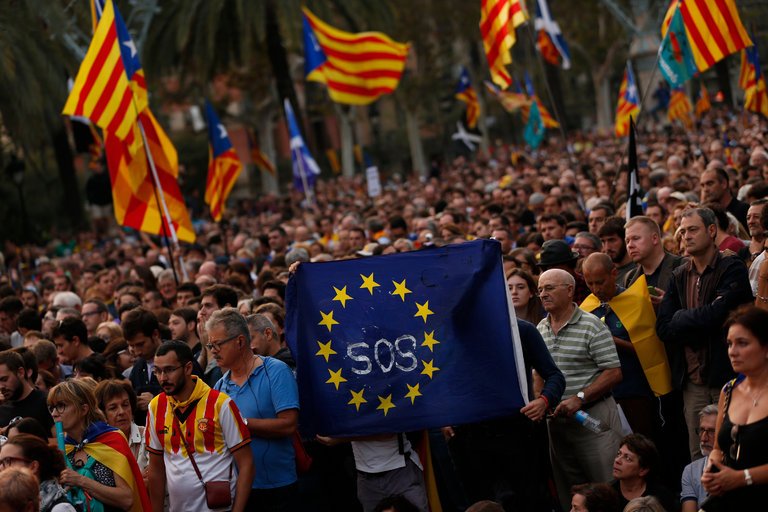Where’s the E.U. in the Catalonia Crisis?
EUROPE, 23 Oct 2017
Susi Dennison – The New York Times

Pro-independence supporters holding the European Union flag during a rally in Barcelona, Spain, on Oct. 10. Credit Francisco Seco/Associated Press
16 Oct 2017 — Amid the crisis in Spain this month — as Catalonia voted in an illegal referendum and threatened to declare independence, and Madrid has struggled to keep control of the situation — many people wondered: Where is the European Union?
The truth is, there is plenty of blame to go around for the Catalonia crisis, and the European Union certainly shares some of it. European Union officials did hold closed-door meetings to try to calm tensions, but they could have done much more earlier to encourage dialogue between Barcelona and Madrid before it was too late. They also should have been clearer in their condemnation of police violence against Catalan voters on Oct. 1.
This probably won’t be the last time such a situation like this arises. Catalonia is just the latest battle in the European Union’s war with populism — a war that it seems to be losing.

A man wears a sticker bearing the flags of the European Union, Spain and Catalonia during a pro-union demonstration in Barcelona, Spain, on Oct. 8.
Credit Albert Gea/Reuters
In recent years, referendums have become the populists’ weapon of choice. They have been used increasingly over the past few years to give “the people” the chance to answer direct questions. In Hungary: Should we participate in the European Union’s refugee relocation program? (Indecisive: Referendum didn’t get sufficient turnout.) In the Netherlands: Should the European Union-Ukraine free trade agreement go ahead? (No.) In Britain: Should we leave the European Union entirely? (Yes.)
These referendums give an impression of democracy, but it is unclear that they really are an expression of the people’s will rather than a way for populist movements to force democratically elected governments’ hands. Still, the European Union, on the losing side in two out of three of these examples, is struggling to fight back against these blurred lines and to defend itself as a project on the side of democratic values.
The key to a referendum is the ability to frame the question. The 2016 Brexit vote is a clear example. Although the referendum was posed a straightforward question (“Should the United Kingdom remain a member of the European Union or leave the European Union?”), discussion around the issue incorporated everything from austerity to “the establishment” to feelings about the government.
In Catalonia, the referendum — which didn’t have constitutional approval — asked whether Catalonia should choose independence from Spain. But in holding the vote illegitimately, the independence movement provoked a response from the Spanish government that changed the question to whether the Spanish government is handling some Catalans’ desire for independence respectfully and peacefully, and indeed why other actors, like the European Union, are not ensuring that it does so. In widening the issue, the separatists have won more sympathy for their cause than they had before the vote.
The reality is that given that there have been missteps on all sides in the Catalonian crisis, Brussels can do little more in the immediate situation than put pressure on both sides behind closed doors. The European Union is an intergovernmental organization constructed with the nation-state as its building block. One of these blocks is Spain. Mediation between the two sides in a dispute is not an option when one of the parties forms part of your decision-making body.
Equally, megaphone diplomacy — like calling out the unconstitutional behavior of the Catalan independence movement — sounds hypocritical with allegations of unwarranted violence by the Spanish police being investigated. But quiet diplomacy has real value, and given the depth of the crisis, European Union leaders should be putting all their power behind it for now.
That’s just in the short term, though. The longer-term responsibility of the European Union’s political leaders is to deal with the causes, not the symptoms, of the growing power of populist forces, of which the Catalonian independence movement is just one.
They need to defuse the desire for an alternative on which populists are playing, by tackling the issues that European citizens care about — identity, jobs, responsive public services and security. The European Union won’t be able to find necessary coherence to provide for its own security, much less project stability into its neighborhood, unless it is able to manage these types of problems. And elected governments delivering on issues close to voters’ hearts can expose the lie that the only solution to their grievances is to vote against the system, in a one-off referendum, rather than to work with it.
_______________________________________
Susi Dennison (@sd270) is a senior policy fellow at the European Council on Foreign Relations and the director of the council’s European Power program.
A version of this op-ed appears in print on October 17, 2017, on Page A1 of the National edition with the headline: E.U. absent from crisis in Catalonia.
DISCLAIMER: The statements, views and opinions expressed in pieces republished here are solely those of the authors and do not necessarily represent those of TMS. In accordance with title 17 U.S.C. section 107, this material is distributed without profit to those who have expressed a prior interest in receiving the included information for research and educational purposes. TMS has no affiliation whatsoever with the originator of this article nor is TMS endorsed or sponsored by the originator. “GO TO ORIGINAL” links are provided as a convenience to our readers and allow for verification of authenticity. However, as originating pages are often updated by their originating host sites, the versions posted may not match the versions our readers view when clicking the “GO TO ORIGINAL” links. This site contains copyrighted material the use of which has not always been specifically authorized by the copyright owner. We are making such material available in our efforts to advance understanding of environmental, political, human rights, economic, democracy, scientific, and social justice issues, etc. We believe this constitutes a ‘fair use’ of any such copyrighted material as provided for in section 107 of the US Copyright Law. In accordance with Title 17 U.S.C. Section 107, the material on this site is distributed without profit to those who have expressed a prior interest in receiving the included information for research and educational purposes. For more information go to: http://www.law.cornell.edu/uscode/17/107.shtml. If you wish to use copyrighted material from this site for purposes of your own that go beyond ‘fair use’, you must obtain permission from the copyright owner.